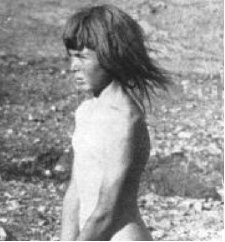
Animal Children – Superminds 13
The story of Mowgli, the boy who was lost in the jungle as a baby, and who was raised by wolves, although fiction, is based on fact. Throughout history, and in all parts of the world, children have been discovered who were loved and raised by an animal. The story of Romulus, who is said to have founded Rome in about 700 BC, and his brother Remus, says they were suckled by a she wolf, and discovered by a shepherd.
Professor Rufat Kazirbayev said doctors had battled to re-educate him to act like a normal human being – but failed. They are now giving up the fight. Professor Kazirbayev said that, “His mind is with the wolves. He will howl at the moon for the rest of his life”.
Djuma, now about 37, is still in hospital. He still crawls on all fours, eats raw meat and bites when frightened. He can speak only disjointed phrases – “Mother dead. Father dead. Brother dead. Sister dead. Mother nice. Father bad.”
Dr. Anna Ticheenskaya said: “presumably his family were killed in a political purge. He has shown us in sign language how, when his mother was killed, she saved him by throwing herself over his body.”
The man who is a wolf
Djuma has learned to brush his hair, clean his teeth and use the toilet “Like a trained animal.” But when taken to the zoo he howls as if he was urging the animals to take him to freedom. Sadly that will never happen. Djuma will probably spend the rest of his life in the clinic where, doctors say, he spends his days like a dog – half asleep and dreaming.
What the life of Djuma teaches us is that being human, being aware of oneself as a unique person, isn’t simply something that happens by itself as we grow. Djuma is still a wolf even though he has what we think is a human body and brain. Some of the things people like Djuma lack that you and I take for granted are a sense of time – meaning we are aware of a past and future; a certainty that we are a person with a name. This leads us to say things like, “I am Sam.” Or “I am Sarah.” So we have a sense of ‘I am’; because we have what we call identity, we have feelings such as being guilty, confident, shy; we also feel separate from other people and animals. Children brought up by animals, unless recovered very young, do not have a sense of time. They lack any feeling of personal identity, and they feel connected with other animals and nature. You might say they are like Adam or Eve, feeling at-one with nature. At seven, it was too late for Djuma to develop into a human. The special thing he lacked was other humans talking to him so he also could learn speech. So language is perhaps something like a piece of computer software our brain uses to gain identity – usually around the name we have been give – and to know time and separateness. This is no doubt why baptism or a social naming ceremony is such an important thing in some societies.
The animal boy of Aveyron
Victor, who was named The Wild Boy of Aveyron, was discovered in the French countryside in 1800. Aveyron is in the South of France, and the villagers captured a boy of about 11 or 12 who had been running wild and naked, even though it was winter. His body was marked with scars where he had fought with animals and been scratched due to his nakedness. Although the villagers tried to speak with Victor, he didn’t seem to pay attention to what was said, and so it was apparent he didn’t know any language. At first people thought he was deaf and mute. All he was interested in was trying to escape.
The story of Victor’s capture spread quickly and he was taken to Paris to be studied. At that time there was an idea that the natural human being was superior to the civilised person. This was called the idea of the ‘Noble Savage’. However, to the inhabitants of Paris, Victor showed no signs of nobility. He was described as, “a disgusting, slovenly boy, affected with spasmodic … convulsive motions… biting and scratching those who contradicted him, expressing no kind of affection for those who attended upon him”. He was therefore thought to be an idiot and was imprisoned in a home for deaf-mutes. Fortunately a young doctor named Jean-Marc Itard looked after him and tried to educate the ‘wild boy’. It was Dr. Itard who gave him the name Victor.
At first Victor learned quickly. Dr. Itard realised, from watching Victor, that he was not deaf, mute or stupid. He was a normal healthy boy, except that he had never been taught how to do all the things most of us take for granted, like sitting in a chair, using the toilet, meeting people without biting them. Within a few months Victor could sit in a chair, express his emotions without being violent, and he could even speak a few words, like ‘milk’, and ‘Oh God’, which was something Dr. Itard’s housekeeper, Mme. Guerin, often said. Victor also came to like Mme. Guerin, who fed and cared for him.
Victor’s learning slowed down after a few months to the point where he never learnt any more words. In his years with whatever animals had raised him, Victor had missed some vital stage of mental growth that would have opened to him the ability to learn continuously and easily. He never regained that loss. Like Djuma the wolf boy, he had missed the years when language and relationship with other people ‘taught’ him to recognise his own identity, and gave him the program enabling him to learn and even initiate new ideas and discoveries. Instead of imitating other human beings, he had learnt to imitate his animal parents. His imitation was too complete.
Victor stayed living in Paris with Mme. Guerin until the age of 40, when he died.
You could be a Wolf, or a Human, or a Star
There are many records of children brought up as babies by animals or completely left uncared for by parents. In the USA a girl baby had been kept in a chicken house, never spoken to our cared for, so she never became a human being. They, like Genie and others, never learnt to speak, and became trained but trapped animals. Most often they are unable to adapt to their life with humans. Speech appears to be like a computer program which when loaded into the human at the right time causes brain changes and the way the brain and our awareness works.
The picture of Genie who was totally neglected as a child see https://www.youtube.com/watch?v=gvSMgi23F3o
The life of Helen Keller throws an enormous light into such children’s ability to learn. Helen was struck dumb and blind at an early age when she had only learnt one word. She lived like an animal without self awareness until the age of eleven. Then she was taught by a deaf and dumb teacher and remembered the first word and quickly began the climb to become a human person.
Then, perhaps because she had learned one word prior to her illness, meaning flooded her darkness. She tells us that “Nothingness was blotted out.” Through language she became a person and developed a sense of self, whereas before there had been – nothing.
This ‘nothingness’ described by Helen Keller is difficult for most of us to imagine, having all our life been exposed to other human beings through behaviour and speech. Helen describes it as having no awareness of personal pain or events. She says that perhaps things happened to her, perhaps they were painful, but as she had no personal self to appreciate this, they were merely passing tactile sensations. She was not personally disturbed by them because she had no ‘person’ to be disturbed. Her story tells us that it is not our DNA which is the cause of our personality with its traits, it is a blend of so many things, including the learning of language, our cultural influence and our upbringing. See Helen Keller
The stories of these children’s lives shows us the enormous influence the early years of learning has on our mind, and how language is like a huge computer program that alters our natural awareness, allowing us to have self awareness and a personality. Isn’t it strange then that if in early childhood we can learn to be a wolf, a bear, or a human, that we don’t recognise this and train babies to be more than human? Perhaps such training would be a step toward reducing the murder, aggression and mental poverty amongst so many humans.
It also leads one to wonder what happened in human evolution to produce speech, and what was it like to swing between the animal type human like Djuma and Victor, and the fully linguistic human. Did they coexist? It is such an interesting subject, that a human being does not have any sense of identity, or develop what we call a personality by simply growing. If left they are nothing much unless raised by an animal that passes on millions of years of experience to the baby. Then it is a wolf or bear and not a human being. So we do not simply have a human personality unless we are taught the amazing program of speech and human thoughts and social responses. Many of us believe we are ourselves because we were born human. Not so. We are carefully fed programs and we are what we are by being taught it. We are programmed – and of course we can learn to recognise that programming and hopefully grow beyond it. See Genius and Habits
But because we were seeds planted by our parent and grew within a human womb, we have a very long history from such, because seeds are from other seeds from the very beginnings of life on earth. So apart from programming we each have an innate self from our heritage and environment. See Seed
What’s it like to be an animal?
Animals do not think using words as we do. They do not therefore speak to themselves or each other in the way we do. But they do feel things. They do respond with strong feelings or indifference to things. So if you want to see what it is like to be an animal, stop thinking about things with words and watch what you feel about people and events. Without deciding what is right or wrong, without asking anyone’s opinion, watch what you want to do from your feelings. Maybe you want to hide under the table like some dogs do. Or maybe you want to sit on someone’s lap, like a cat. For a while, can you dare to do that? If you let everyone know that at the moment you are a cat or a dog, I am sure it will be okay.
Return to Chapter Links – Go to Chapter Fourteen


Comments
An outstanding share!I’ve just forwarded this onto a friend who had been doing
a little homework on this. And he in fact bought
me breakfast simply because I stumbled upon it for him…
lol. So allow me to reword this…. Thank YOU for the meal!!
But yeah, thanks for spending time to talk about this topic here on your site.